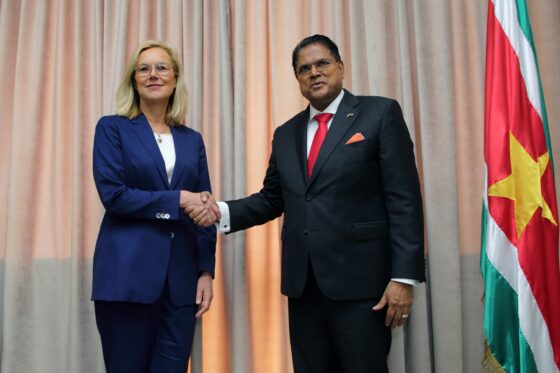Suriname’s president welcome slavery apology but criticises approach


The president of Suriname, Chan Santokhi, has said his government should have been consulted better before Mark Rutte issued a public apology for the Netherlands’ slave trading past on Monday.
Santokhi was positive about the content of Rutte’s speech, calling it a ‘clear’ statement of ‘Dutch involvement in the inhumane treatment of people who were taken to Suriname by force over a long period to work as slaves for the Dutch economy.’
But he remained critical of the way the apologies were drafted and delivered, on a date determined by ministers in The Hague with no input from Suriname or the Caribbean islands.
‘A collective approach from the start would have been a more acceptable way of working towards a moment of rehabilitation.
‘This is about centuries of oppression and exploitation. Offering apologies also means acknowledging the momentum, cultural aspects of the descendants of enslaved people and making the moment when you apologise meaningful.
‘Specifically, the preparations for offering apologies are just as important as how you apologise in practice.’
Criticism in advance
The cabinets plans to apologise on December 19 were roundly criticised, both for the ‘arbitrary’ date and the way in which the governments of former colonies first learned about them from leaks in the Dutch media in November.
Six organisations campaigning for equal rights took legal action to try to delay the apologies until July 1, the official commemoration of the abolition of slavery in Suriname known as Keti Koti, but the district court in The Hague said it was a ‘political matter’.
Rutte’s apology was mostly positively received, but campaigners said they expected the prime minister to act on his pledge to place ‘a comma, not a full stop’ at the end of his statement, recognising it was a stage in an ongoing process.
‘It’s really a historic moment,’ said Kathleen Ferrier, chair of the Dutch UNESCO commission.’ I saw a prime minister who was humble, who took note of the facts and said he had learned and is looking to the future.’
‘First step’
Karwan Fatah-Black, assistant professor of history at Leiden University specialising in the Dutch colonial past, said Rutte’s speech was the outcome of work by ‘all the people and activists who have put this on the map and called for recognition.’
Evelyn Wever-Croes, prime minister of Aruba, said the Caribbean nation was ‘grateful for the first step’ and described the apologies as ‘a turning point in the history of the kingdom’. ‘We now have the chance to work together on a better future as equal countries,’ she said.
Silveria Jacobs, president of Sint Maarten, said more research needed to be done into the causes and consequences of slavery, as well as the question of responsibility. ‘We must play a leading role in the discussion; only then can we determine what action the Dutch government needs to take.’
Sylvana Simons, leader of the left-wing equal rights party BIJ1 in the Dutch parliament, was complimentary about the way Rutte’s views on the issue had changed.
‘Colonial and outdated’
Rutte himself said in TV interviews that the death of George Floyd in Minneapolis in police custody two years ago had changed his views on the relationship between the present and the past, while in his speech he referred to the legacy of racism and social inequality.
‘It feels as if the realisation has really sunk in, from the mouth of someone who 18 months ago was still saying: I don’t see the point,’ Simons told talk show Op1.
But Hannah Belliot, the Labour party (PvdA) politician who brought the court case last week, said it felt as if the apologies had been imposed by The Hague rather than negotiated.
‘He [Rutte] is deciding for the descendants of the history of slavery when apologies should be made,’ she said. ‘That is painful, colonial and outdated.’
Thank you for donating to DutchNews.nl.
We could not provide the Dutch News service, and keep it free of charge, without the generous support of our readers. Your donations allow us to report on issues you tell us matter, and provide you with a summary of the most important Dutch news each day.
Make a donation